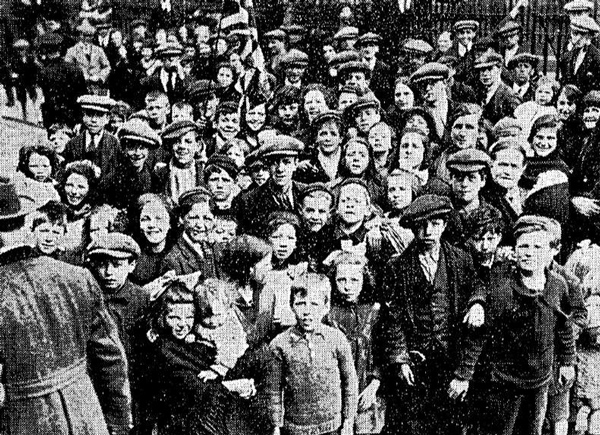Nationalists help elect Independent Unionist in West Belfast as Governor General travels to Derry
Belfast, 4 May 1923 - In what is being described as a ‘bombshell’ result, the official Unionist party candidate has been defeated in a by-election contest for the West Belfast seat for Westminster, which has been vacant since Mr. T.W. Twaddell was shot dead last year.
The result of the vote saw Independent Unionist candidate Colonel Woods defeat Sir Joseph Davidson by 27,219 votes to 19,360, a winning margin of 7,8594.
Mr. Davidson declared after the vote that while he had been ‘defeated’ he had not been ‘disgraced’ and that his opponent had been able to call upon a solid Nationalist vote as well as anti-prohibitionists and supporters of the spirit trade. He added that he now hoped his opponent would provide the ‘ex-Servicemen and the workingmen of Belfast the services he has promised them.’
The tensions created within unionism by the election were evident at the announcement of the result in Belfast City Hall and by the crowd's reaction to the speeches by the two candidates. Colonel Woods was required to shout above the clamour of his opponents supporters. ‘My loyalty has been called into question’, he roared. ‘I belong to two military orders of which the King is head.’
The Northern Whig newspaper remarked that while it was Colonel Woods who would occupy the seat for West Belfast, its real captors were the Sinn Féin and Nationalist electors and he owed his win to them. ‘They came up in almost their full strength, acting on the principle that any stick is good enough to beat a loyalist Government with...Politics, like poverty, sometimes makes those who engage in them acquainted with very strange bedfellows.’
Addressing a meeting of the South Down Association in Newcastle, the Northern Ireland Minister for Labour, Mr. J.M. Andrews expressed regret that unionists had chosen to oppose each other in West Belfast. Mr. Andrews said that while it was acceptable to criticise the Government of which he was a part, on the occasion of an election it was crucial for unionists to close ranks in order to show the people of Great Britain that the people of Ulster were as true to their principles as ever.
Mr. Andrews referenced his tour in the company of Lord Derby and Sir James Craig of the counties Fermanagh, Tyrone and Londonderry in which they inspected the forces of the RUC and said the experience had convinced him that the inhabitants of these counties would continue to maintain the six-county parliament.
In other northern developments, the Governor General of Northern Ireland, the Duke of Abercorn, has made his first state ‘entry’ into the city of Derry where he was accorded a full civic ceremonial. As well as the extensive decoration of the city in loyal flags and bunting, a procession route was plotted out and lined with British troops, RUC personnel and members of the ‘Specials.’
The Governor General was presented with keys to the four gates of the City as a symbol of the city’s welcome and its allegiance to the King. The ceremony concluded at the Guildhall where the Duke of Abercorn delivered an address.
British Pathé footage footage of the state visit to Derry of the Duke of Abercorn as Governor General in May 1923
[Editor's note: This is an article from Century Ireland, a fortnightly online newspaper, written from the perspective of a journalist 100 years ago, based on news reports of the time.]





















